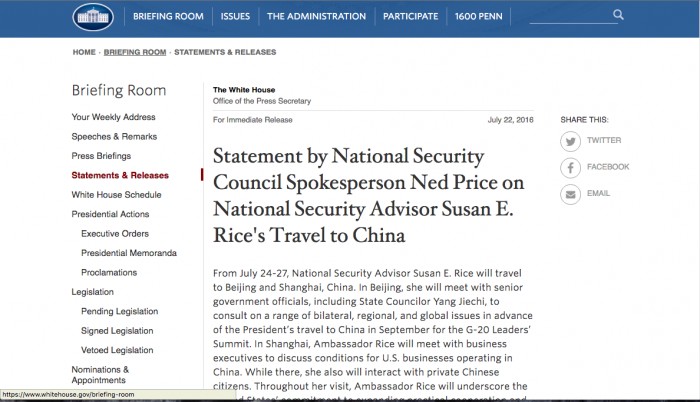Media Report

- Reuters reports: "U.S. National Security Adviser Susan Rice will urge Beijing next week to avoid escalation in the South China Sea when she makes the highest-level U.S. visit to China since an international court rejected its sweeping claims to the strategic waterway....Rice - in an interview with Reuters – vowed that the U.S. military would continue to 'sail and fly and operate' in the South China Sea, despite a Chinese warning that such patrols could end 'in disaster.' With less than six months remaining of President Barack Obama's tenure, Rice's broader mission in her July 24-27 trip is aimed at keeping overall ties between the world's two largest economies, which she called 'the most consequential relationship we have,' on track at a time of heightened tensions. 'I'll be there to advance our cooperation,' she said."
- The Wall Street Journal reports: "Earlier this month, President Xi Jinping and Premier Li Keqiang both delivered forceful instructions on how to reform China's state-owned sector. Their messages directly contradicted one another....Party insiders and China experts say the conflicting messaging and other recent episodes, including thinly veiled criticism of Mr. Li's policies from the Xi camp, show how discord between the top two Chinese leaders is increasingly spilling into the open, a remarkable departure from the unified front China's leaders traditionally seek to present....Officials involved in overseeing the state sector have gathered in recent days to 'study the spirit' of the conflicting July 4 instructions."
- The Washington Post reports: "Trump — a frequent critic of Chinese trade policies — was being anointed as the party's candidate in November's presidential election, and used his acceptance speech at the convention in Cleveland to pledge that he would stop China's 'outrageous theft of intellectual property, along with their illegal product dumping, and their devastating currency manipulation.' He also said he would renegotiate trade deals, specifically mentioning China's World Trade Organization accession agreement. His comments are likely to provoke China, which has already lashed out at the Republican Party over its criticisms of Beijing, accusing it of levelling groundless accusations and meddling in China's internal affairs."
Calendar
- 2016-07-21 China's Calls for South China Sea Talks Face Challenges
- 2016-07-20 Top US admiral says China exchanges conditional on safety
- 2016-07-19 Philippines says it rejected China offer of talks on South China Sea
- 2016-07-18 China to Close Part of South China Sea for Military Exercise
- 2016-07-17 China's urban air quality improves in first half - ministry
- 2016-07-15 China media again touts plans to float nuclear reactors in disputed South China Sea
- 2016-07-14 China’s actions in South China Sea seen as defying ruling
- 2016-07-13 China on Pace to Meet Economic Targets This Year, Premier Says
- 2016-07-12 Beijing’s South China Sea Claims Rejected by Hague Tribunal
- 2016-07-11 China Intensifies Opposition Ahead of South China Sea Ruling
News
- Reuters Exclusive: Top Obama aide to take call for South China Sea calm to Beijing
- The Wall Street Journal Discord Between China's Top Two Leaders Spills Into the Open
- The Washington Post Trump blasts China for trade, currency actions
- Bloomberg Business Li Says China Can't Shoulder Global Economy's Heaviest Burden
- The New York Times NKorean Airliner Catches Fire, Makes Forced Landing in China
- BBC News Larung Gar: China 'destroys buildings' at Tibetan Buddhist academy
- The Washington Post China tried to drive a furry mammal to extinction. Maybe that wasn't such a good idea.
- Reuters Philippines' oil still in troubled waters after South China Sea ruling
- The Financial Times World Bank urges China to deepen healthcare reform
- The New York Times Chinese Workers Dismantle Tibetan Study Site, Evict People
- The Wall Street Journal New U.K. Treasury Chief to Visit China
- ABC News China Arrests Popular Village Head on Graft Charges
- The Financial Times Millennials' tastes shape China's outbound acquisitions
Commentary
- The Washington Post KFC and iPhones are the latest targets for Chinese nationalists
- Foreign Policy How to Explain Xi Jinping's Mounting Foreign Policy Failures
- Bloomberg View China Should Make It Easier to Become Chinese
- The Diplomat Duterte, Regional Security and the South China Sea
- Council on Foreign Relations China Sold Reserves in June, Just Not Very Many
- Foreign Policy: Tea Leaf Nation 'Security Is Only as Good as Your Fastest Computer'
- The National Interest It's Time to Ignore China's Nine-Dash Line
